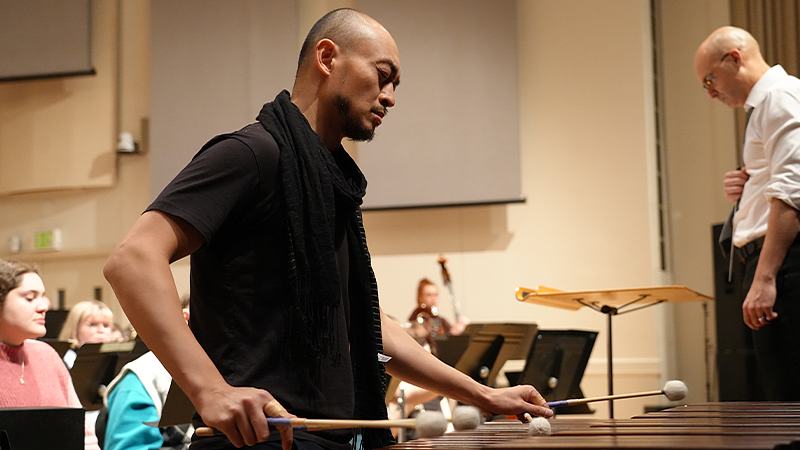OWE rehearses for the November 26 concert in Beall Hall
Don’t miss the highly anticipated wind ensemble premiere of Princess Chang Ping by the Oregon Wind Ensemble (OWE) on November 26!
The stunning orchestral work, composed in 2012 by sought-after artist and School of Music and Dance (SOMD) faculty member Pius Cheung, has been newly reimagined specifically for the Oregon Wind Ensemble.
Cheung rehearses for the November 26 concert
“After listening to the piece, I hope [the audience] walks away touched,” Dr. Cheung said. “My students make fun of me when I say this, but a lot of my music is like Chinese Romeo and Juliet. This one specifically is like star-crossed lovers. The [main characters] fall in love, war breaks out, they die, reunite in the afterlife, and rise up to heaven, so I hope [the audience] feels lifted afterwards.”

Dr. Cheung plays marimba cadenza in Princess Chang Ping
The new arrangement for wind ensemble is the result of a collaboration between Cheung, OWE conductor Dennis Llinás, and OWE students. They worked for several weeks to find the proper instrumentation and coloring for the work.

What I’m probably most excited about is to work with a musician and world-class artist like Pius.
Cheung’s inspiration for the work:
Princess Chang Ping was commissioned and premiered by Pei-Ching Wu and the National Taiwan Symphony Orchestra under Fusao Kajima in 2012.
The November 26 concert will also feature works by Bernstein, Schubring, and Graham. Titled “Metropolis,” the repertoire is inspired by the core message of the 1927 film by the same name. The evening’s programming aims to embrace the “human factor” of life, joy, grief, laughter, and enjoying every fleeting moment of life.
